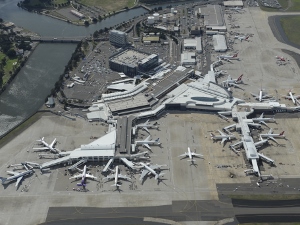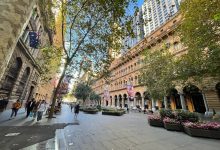
Departure tax to rise to pay for more security?
The cost of heightened security at Australian airports is likely to be passed on to consumers through an increase in the departure tax.
The federal government’s review of border-related fees, taxes and charges must consider tourism as a major export earner that generates tens of billions of dollars of economic activity across Australia, according to peak national industry body, Tourism & Transport Forum.
Minister for immigration and border protection Scott Morrison has announced that a review will look at the passenger movement charge and the cost of visitor visas to Australia.
In welcoming the review, TTF acting chief executive Trent Zimmerman said the review must consider reducing the burden of taxes and charges on visitors to make the sector more internationally competitive. “If the government is serious about tourism’s role as an economic development strategy, this review must look at the impact of taxes like the passenger movement charge on the sector,” Mr Zimmerman said. “Constraining the review by requiring budget neutrality will limit its potential to maximise the benefits this review could deliver – the government needs to be bolder. Tourism is a major export earner and a growth industry for Australia and must not be conflated with other aspects of national security as a drain on the public purse.
“International tourism generates $30 billion a year in export earnings for Australia, making it the country’s most valuable services export, and more than 540,000 Australians are directly employed in tourism across the country. With the mining investment boom waning and the decline in heavy manufacturing, Australia needs to foster industries of the future by reducing barriers to growth for sectors like tourism.
“Reducing the cost of coming to Australia through cutting the passenger movement charge and the cost of visas from growth markets in Asia has the potential to deliver massive benefits to Australia.
“In fact, the International Air Transport Association estimates that abolishing the PMC alone would add some $1.7 billion to the Australian economy annually, far outweighing the tax revenue.
“The passenger movement charge is a tax on tourism that reduces Australia’s competitiveness as a destination and that disproportionately impacts short-haul visitors to Australia. The PMC is the highest departure tax in the developed world for short-haul flights, adding a significant burden to the cost of an airfare for visitors from important source markets like New Zealand and Indonesia.
“The PMC collects more than $900 million a year, while border processing at Australia’s international airports costs around $230 million a year, meaning it over-collects by almost $700 million a year.
“The fees review must also address the inequity of visa charges for visitors from Australia’s growth markets, like China, who pay over six times more in visa charges than visitors to Australia from countries like the UK and USA. It makes little economic sense to spend millions of dollars promoting Australia as a destination and then placing financial and administrative barriers in the way of the very visitors you are trying to attract.
“Other countries have recognised the benefits of international tourism and have reformed their visa systems – including reducing the cost, allowing multi-year, multi-entry visas and streamlining requirements – to facilitate tourism growth.”







